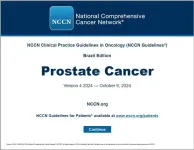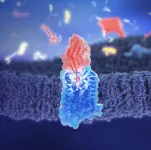International collaboration addresses rising cancer rates in South America
National Comprehensive Cancer Network and Latin American Cooperative Oncology Group to publish cancer treatment guidelines tailored for Brazil.
2024-10-09
(Press-News.org) PLYMOUTH MEETING, PA [October 9, 2024] — The National Comprehensive Cancer Network® (NCCN®)—an alliance of leading cancer centers in the United States—announces a renewed collaboration with the Latin American Cooperative Oncology Group (LACOG) to improve cancer outcomes in South America. The international oncology organizations worked together to publish new NCCN Clinical Practice Guidelines in Oncology (NCCN Guidelines®) for Prostate Cancer: Brazil Edition.
The NCCN Guidelines® for Prostate Cancer: Brazil Edition are now available free-of-charge at NCCN.org/global. Additional Brazilian adaptations of NCCN Guidelines for other cancer types are planned for the future.
"Cancer care in Brazil and throughout Latin America should follow internationally accepted best practices while addressing the unique challenges faced by healthcare providers in the region,” said Dr. Karine Trindade, Chair of the LACOG Genitourinary Group. “Standardizing care through evidence-based expert consensus-driven guidelines is associated with better patient outcomes and more efficient resource use. By formalizing these recommendations, we ensure that our medical teams can offer the most up-to-date, expert-vetted treatments tailored to the specific needs of the Latin American population."
Prostate cancer was selected as the first NCCN Guidelines Adaptation to come out of this collaboration based on need. It is the most common cancer type for men in Brazil and the second highest cause of cancer death.[1] The incidence of prostate cancer in the region has been rising steadily by 3-5% a year,[2] adding to a growing need for access to established, evidence-based treatment recommendations.
“It is always an honor to work with local experts and exchange critical knowledge to enhance care for people with cancer,” said Crystal S. Denlinger, MD, Chief Executive Officer, NCCN. “This work with LACOG enhances our efforts to define and advance high-quality, high-value, patient-centered cancer care globally. It enables us to adapt our world-renowned NCCN Guidelines to the specific circumstances in Brazil, so that providers have information at their fingertips to help patients with cancer live better lives.”
NCCN Guidelines are the recognized standard for clinical direction and policy in cancer management and the most thorough and frequently updated clinical practice guidelines available in any area of medicine. The primary versions are written by subject-specific, multidisciplinary panels of experts from across leading cancer centers in the United States. Studies have shown that treatment that matches guideline recommendations is associated with longer survival and better outcomes.
The NCCN Global Program first began working with LACOG in 2011, and subsequently embarked on new projects in 2021 to increase accessibility to NCCN Guidelines and related content for providers, patients, family members, and caregivers in Latin America.
There are currently more than 20 global adaptations of the NCCN Guidelines, along with more than 270 translations across 51 languages. NCCN Harmonized Guidelines™ and NCCN Framework for Resource Stratification (NCCN Framework™) offer additional recommendations for defining appropriate treatment for differing resource levels. Learn more at NCCN.org/global.
# # #
About the National Comprehensive Cancer Network
The National Comprehensive Cancer Network® (NCCN®) is a not-for-profit alliance of leading cancer centers devoted to patient care, research, and education. NCCN is dedicated to improving and facilitating quality, effective, equitable, and accessible cancer care so all patients can live better lives. The NCCN Clinical Practice Guidelines in Oncology (NCCN Guidelines®) provide transparent, evidence-based, expert consensus recommendations for cancer treatment, prevention, and supportive services; they are the recognized standard for clinical direction and policy in cancer management and the most thorough and frequently-updated clinical practice guidelines available in any area of medicine. The NCCN Guidelines for Patients® provide expert cancer treatment information to inform and empower patients and caregivers, through support from the NCCN Foundation®. NCCN also advances continuing education, global initiatives, policy, and research collaboration and publication in oncology. Visit NCCN.org for more information.
[1] Tourinho-Barbosa RR, Pompeo AC, Glina S. Prostate cancer in Brazil and Latin America: epidemiology and screening. Int Braz J Urol. 2016 Nov-Dec;42(6):1081-1090. doi: 10.1590/S1677-5538.IBJU.2015.0690. PMID: 27622278; PMCID: PMC5117963.
[2] Mónica S. Sierra, Isabelle Soerjomataram, David Forman, Prostate cancer burden in Central and South America, Cancer Epidemiology, Volume 44, Supplement 1, 2016, Pages S131-S140, ISSN 1877-7821, https://doi.org/10.1016/j.canep.2016.06.010.
END
[Attachments] See images for this press release:

ELSE PRESS RELEASES FROM THIS DATE:
2024-10-09
The secret to losing weight could all be down to a combination of 14 ‘skinny genes’, a new study has found.
University of Essex researchers discovered they helped people drop twice as much weight when they ran for half an hour three times a week.
The team - led by Dr Henry Chung, from the School of Sport, Rehabilitation and Exercise Sciences - found those with more of the genes slimmed the most across eight weeks.
People with the most markers lost up to 5kg during the study and people without ...
2024-10-09
EMBARGOED UNTIL OCTOBER 9, 2024 AT 6:30 AM ET
Brigham researchers found people with wide-ranging long COVID symptoms were twice as likely to have SARS-CoV-2 proteins in their blood, compared to those without long COVID symptoms
A persistent infection could explain why some people experience long COVID symptoms, according to a new study led by researchers at Brigham and Women’s Hospital, a founding member of the Mass General Brigham healthcare system. The team found evidence of persistent infection in 43 percent of participants with cardiopulmonary, ...
2024-10-09
Research Highlights:
An analysis of UK Biobank health data that included adults who had mild to severe COVID-19 before vaccines were available found an increased risk of heart attack, stroke and death among those adults during the nearly three-year follow-up period after COVID infection.
The elevated risk of heart attack, stroke and death linked to COVID-19 infection was found to be comparable to cardiovascular risk factors such as Type 2 diabetes, peripheral artery disease and cardiovascular disease.
The study found that having a non-O blood type (A, B, AB) was associated with an increased risk of heart attack and stroke among ...
2024-10-09
Wednesday, October 9, 2024, Cleveland: A history of COVID-19 can double the risk of heart attack, stroke or death according to new research led by Cleveland Clinic and the University of Southern California.
The study found that people with any type of COVID-19 infection were twice as likely to have a major cardiac event, such as heart attack, stroke or even death, for up to three years after diagnosis. The risk was significantly higher for patients hospitalized for COVID-19 and more of a determinant than a previous history of heart disease.
Further genetic analysis ...
2024-10-09
Opioid drugs are highly effective at relieving pain but come with severe drawbacks. Their side effects range from dizziness to potentially fatal respiratory depression. Their illegal use contributes to nearly half a million deaths worldwide each year. Researchers from the University of Geneva (UNIGE) have discovered a molecule, called nanobody NbE, which binds tightly and durably to the cell receptors that usually bind to opioids, thereby blocking the drugs’ activity. Moreover, the scientists were able to create even smaller molecules that retain the same properties, which could prove far more effective than current treatments in ...
2024-10-09
New research identifies for the first time the genes that help plants grow under stressful conditions - with implications for producing more sustainable food crops in the face of global climate change.
Led by the University of East Anglia (UEA), the study reveals the genes that enable plants to make a novel anti-stress molecule called dimethylsulfoniopropionate, or DMSP. It shows that most plants make DMSP, but that high-level DMSP production allows plants to grow at the coast, for example in salty conditions.
The research also shows that plants can be grown under other ...
2024-10-09
It’s one of the basic tenets of biology: We get our DNA from our mom and our dad.
But one notable exception has perplexed scientists for decades: Most animals, including humans, inherit the DNA inside their mitochondria —the cell’s energy centers – from their mothers alone, with all traces of their father’s mitochondrial genome destroyed the moment sperm joins egg.
A new University of Colorado Boulder study published Oct. 4 in the journal Science Advances sheds new light on why this happens, showing that when the process fails, and paternal mitochondria slips into a developing embryo, it can lead to lasting neurological, behavioral and reproductive ...
2024-10-09
Plant-based diets, compassionate agriculture, Indigenous methods, consumer pressure, new laws, international agreements and even vegan pets – these are the solutions for fixing our broken food and farming systems, say dozens of environmental advocates, researchers, farmers and industry pioneers in a new book.
Editors Joyce D’Silva and Carol McKenna sound the alarm in their introduction to Regenerative Farming and Sustainable Diets, warning that ‘our food system is broken’. Radical change is needed, they say, in our world where one‑third of food is lost or wasted, 780 million people ...
2024-10-09
Step aside tropical rainforests and coral reefs — the latest hotspot to offer awe-inspiring biodiversity lies no further than your bathroom.
In a new Northwestern University-led study, microbiologists found that showerheads and toothbrushes are teeming with an extremely diverse collection of viruses — most of which have never been seen before.
Although this might sound ominous, the good news is these viruses don’t target people. They target bacteria.
The microorganisms collected in the study are bacteriophage, or “phage,” a type of virus that infects and replicates inside of bacteria. Although researchers know little about them, phage recently ...
2024-10-09
Obesity and type 2 diabetes are risk factors for various malignancies, including pancreatic cancer, which has a high death rate. A new analysis in Diabetes/Metabolism Research and Reviews suggests that weight-loss surgery—also called metabolic-bariatric surgery—may lower the risk of developing pancreatic cancer in people with obesity, especially in those who also have type 2 diabetes.
In the systematic review and meta-analysis, investigators identified 12 relevant studies that explored the effects of metabolic-bariatric surgery on pancreatic cancer incidence, with a total of 3,711,243 adults ...
LAST 30 PRESS RELEASES:
[Press-News.org] International collaboration addresses rising cancer rates in South America
National Comprehensive Cancer Network and Latin American Cooperative Oncology Group to publish cancer treatment guidelines tailored for Brazil.



